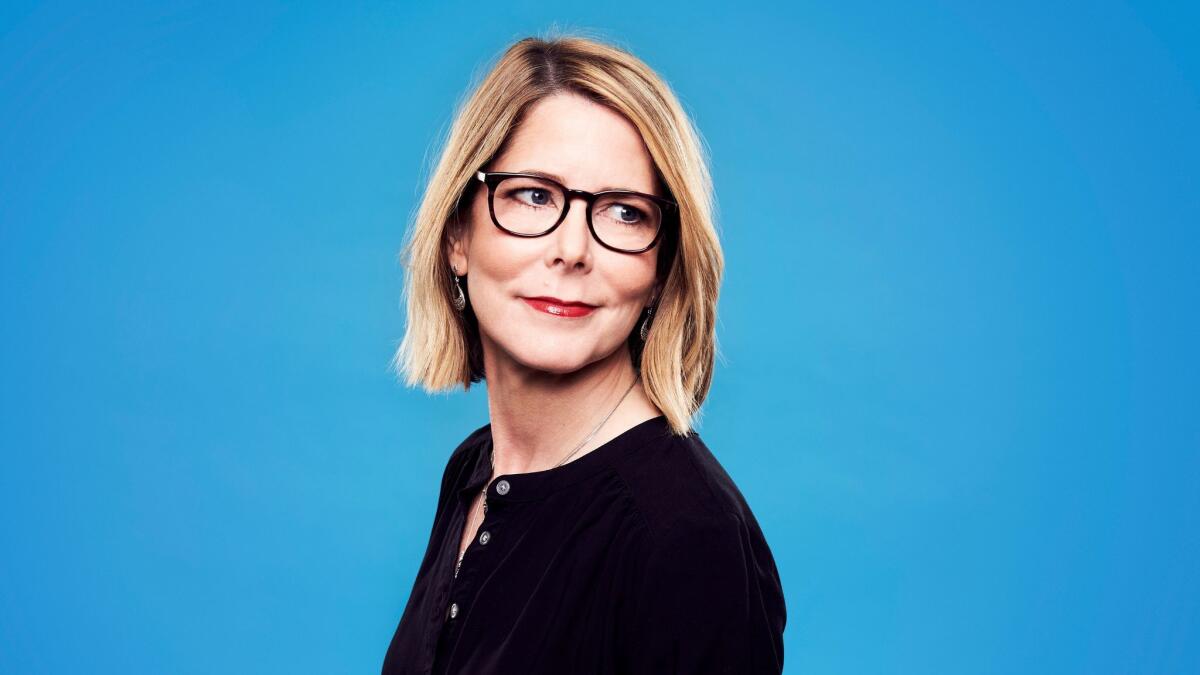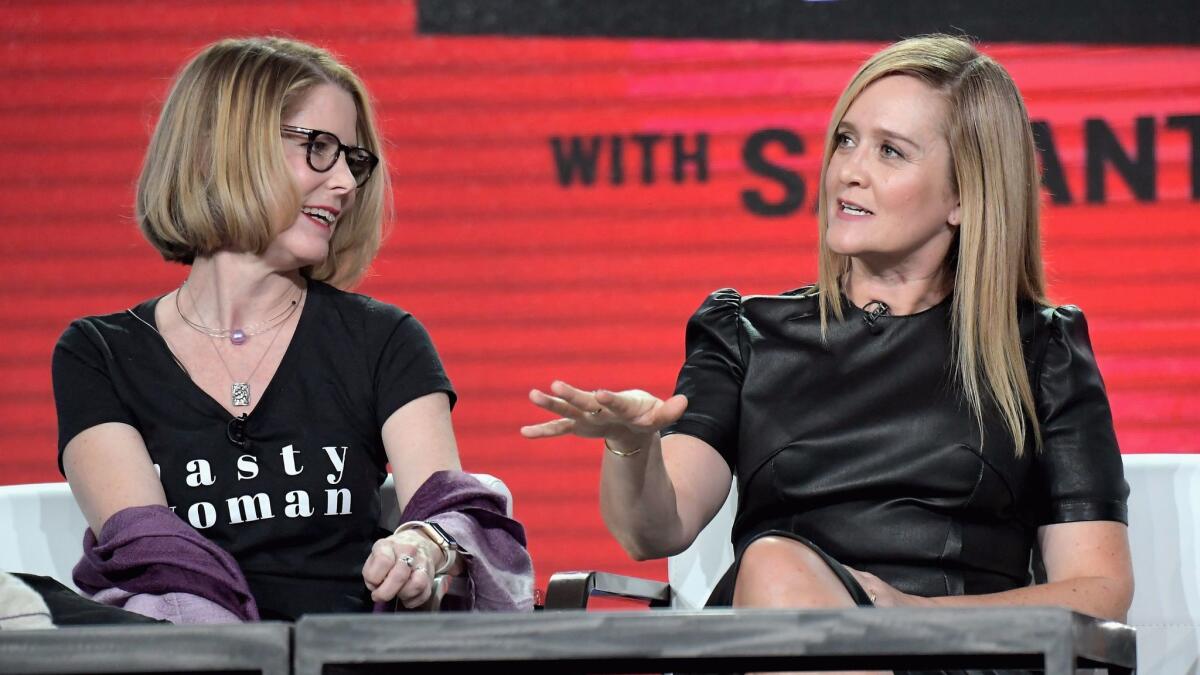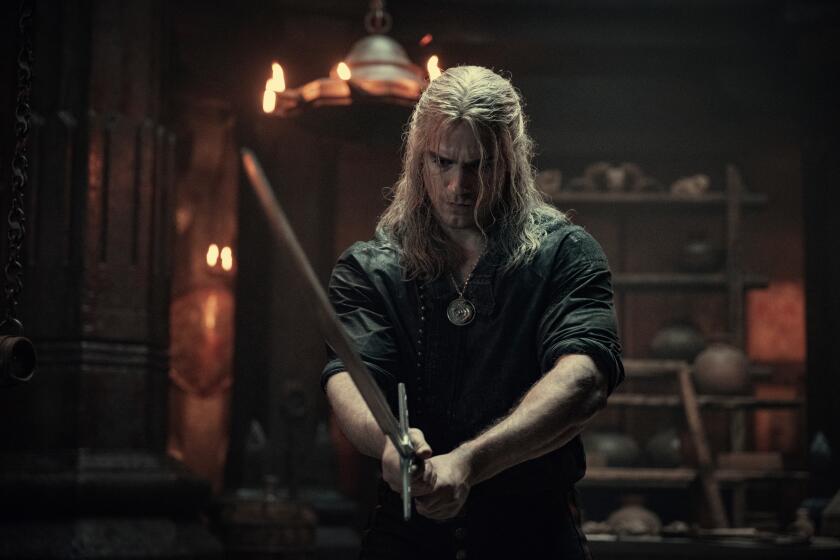‘Full Frontal’ showrunner Jo Miller guides a hectic show and relaxes with post-apocalyptic novels
With typical irreverence, Jo Miller, showrunner and executive producer of “Full Frontal With Samantha Bee,” is explaining her unlikely journey from PhD candidate in medieval Jewish history to a professional comedy writer.
“Pogroms — they’re a laugh riot!” she says.
After fleeing academia, dabbling in real estate and construction management, Miller landed a writing gig at “The Daily Show” in 2009, where she discovered a knack for filthy puns.
Miller has since brought her voracious intellect and love of research to “Full Frontal,” helping it stand out in a crowded field for political humor. The show, which airs weekly on TBS, is nominated for two Emmys. The awards show is Sunday night.
Miller and her team also won an Emmy last weekend for their writing on the special “Not the White House Correspondents’ Dinner.”
A transplanted Southerner who studied at Yale and Cambridge, Miller recently met near her home in upstate New York to talk about political satire in the age of
How did you wind up studying medieval Jewish history?
I was the world's biggest Peter O'Toole fan. And professor John Boswell was teaching a High Middle Ages course [at Yale] and on the syllabus was "The Lion in Winter." I thought, cool, I'll take this course! He was one of the most brilliant medievalists ever. So I started taking other classes. It was this accident we had this flourishing Judaic studies department in the ’80s with these amazing scholars. I was so lucky to be there.
Your academic background is surprisingly relevant in 2017.
I always said the minute that nearly every survivor of World War II is dead, the cycle starts up -- the denial — because at that point it's no longer living history.
In West Germany they wallowed in guilt for half a century [after the Holocaust]. We never dealt with slavery, we never dealt with the murderous legacy of Jim Crow. I grew up in Georgia. We were taught “Gone With the Wind” as history, that Robert E. Lee was a great guy. He was an .... We, as a people, really cherish myth.

I spent I don't know how many decades studying anti-Semitism and I had my own show where I can say whatever I want and a Nazi rally happens, and it's off!
— Jo Miller
Was it hard to be off the air the week of Charlottesville, Va.?
My whole life had been leading up to this point. I spent I don't know how many decades studying anti-Semitism and I had my own show where I can say whatever I want and a Nazi rally happens, and it's off that week? I nearly died. These weekend Tiki warriors, inherently ridiculous with their khakis. You could tell these guys were venturing out of their cave for the first time. They were taking this tentative glee in being able to utter the racial epithets they'd been typing for so long.
You also dabbled in comedy in college?
Steve Bodow, who’s the showrunner at “The Daily Show,” and I started an improv group at Yale. That's the one good thing I ever did in my life. We were terrible our first year. We got better after our second year after we tapped a really good group of freshmen including Austan Goolsbee [chairman of the White House Council of Economic Advisers under President Obama]. He was one of the powerhouses.
Bodow eventually asked you to apply at “The Daily Show.”
They needed women. At that moment they didn't have any. It was total affirmative action.
Were you intimidated? It was your first full-time comedy job.
Everybody was so much smarter and funnier than I was. I felt like I was drowning. It was a big room and it could really be hard to be heard, and Jon [Stewart] was always the best about making contact and asking people to repeat something if they got talked over. Women did tend to get talked over, not through malice or anything -- because we let ourselves.
What did you learn from Jon Stewart?
Everything. I worked on nearly a thousand shows. Nobody is Jon, and nobody will ever be Jon. What he did in three hours still takes me three days. He would start with a thing he wanted to say, even if he didn't know the exact parameters of it, then he felt his way through multiple drafts and followed that thread of whatever had gotten that fish hook into his chest. Sometimes it wasn't until the rewrite that he discovered what that was. Jon taught me how to get to that point and never be satisfied until you've finished it and tied it off at the end.

Did you and Samantha Bee always know what your show would look like?
We couldn't have anticipated a Trump presidency. But we knew what kind of show we wanted to do. We wrote up a document telling TBS we wanted it to be completely authentic. If they wanted millennials, that's how to get them. We wanted it to be unapologetically smart and if they couldn't keep up, that's fine. We didn't want it to be at a desk, we wanted it to be much faster. That's one of the things that our writers have to learn: shrink-wrap it. This is 15 words where I need two. I wish I had four more minutes. Make the show 25 minutes instead of 21, and then I could let Sam breathe.
Do you buy into the idea that Trump is a gift to comedians?
No, that's ... ridiculous. Chaos and meaninglessness are not good for comedy. Comedy shines an off-angle light at a thing to make it comprehensible and to make you see the absurdity of it. You shine an off-angle light at pure chaos and meaninglessness, it's just another angle of meaninglessness. Satire is really at a loss to deal with madness.
Man, to think back when we were making fun of Ted Cruz. That was fun.
As a student of history, do you have any prognostications about Trump?
One thing I've learned is my prognostications are wrong. And the temptation to prognosticate should just be strangled and drowned in a bath. The [recent] natural disasters have shown me that, for now, the American people's impulses are to help each other and run into the fire and do superhuman things on behalf of strangers. But at the same time we don't live our normal life up to our [midsection] in poop water. We live it on Twitter and Facebook where there are forces poking probes at our amygdala to make us hate each other. So we stand on a knife edge between our hurricane self and our Facebook self.
Your job really requires you to follow the news. What do you do to decompress?
I read post-apocalyptic novels. They cheer me up. Diseases are my favorite. I'm on the ProMED email list, you get emails about every contagion in the world. I love the end-of-the-world genre. I've loved them since I was a child and "A Canticle for Leibowitz" came out. “The Stand" [by
What else are you reading or watching these days?
I just read this food genealogy book, "The Cooking Gene,” by Michael Twitty. It's tracing his family's roots in West Africa and also in the South. It's beautifully, lyrically written and so deeply familiar to me. He talks lovingly and passionately about the role of food in communities and people's lives. It enthralled me.
See the most-read stories in Entertainment this hour »
Follow me @MeredithBlake
The complete guide to home viewing
Get Screen Gab for everything about the TV shows and streaming movies everyone’s talking about.
You may occasionally receive promotional content from the Los Angeles Times.



